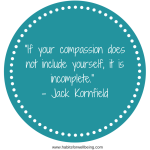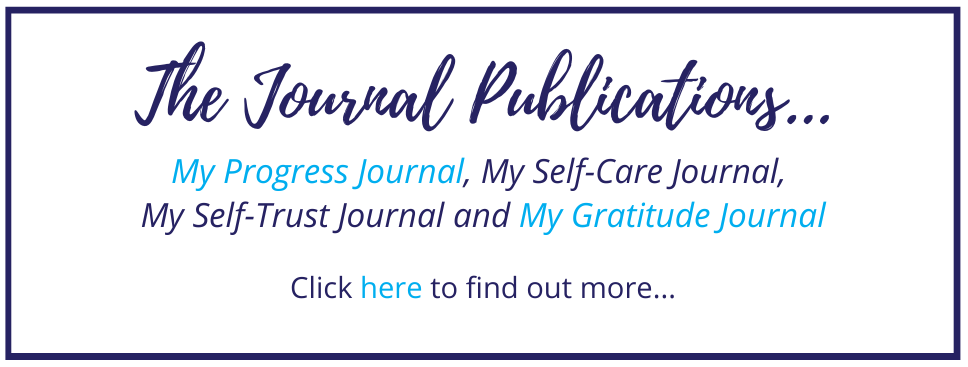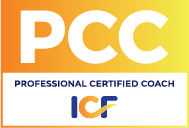“Don’t worry about what the world needs, ask what makes you come alive and do that because what the world needs are people who have come alive.” ~ Howard Thurman
Have you ever wanted to try something new, change something, ask for help or pursue a passion? Then, as you muster enough courage to take small steps towards these changes or situations, you start to feel nervous, anxious or fearful?
You may even notice a voice inside your head constantly evaluating you why these changes could never happen – you’re not clever or skilled enough, everything you do is wrong, you’ll run out of money or a variety of other distorted thoughts.
Well done – you are human! And, we all have this self-criticism and quite often a self-sabotaging voice inside our heads that can hold us back. Some people are aware of this inner critic or voice and some people are not.
This voice inside our heads has been referred to by many names. Some people refer to this voice as the voice of ego or super ego, the little me, lower personality, limiting beliefs, sub-personality, monkey mind, saboteur and also linked in with the shadow. Today, I am going to refer to it as the inner critic or the “outside voice”.
The Inner Critic…
The inner critic or “outside voice” inside your head can –
- Store the rules on how you “should be” and then if you don’t follow the rules, punish you.
- Often believes all of the negative/bad stuff said about you growing up (from family, friends, teachers, coaches) and reminds you of it constantly, so you are continually trying to be liked and striving to be better.
- Stop you from trying something new in case you make mistakes. If you do try something new, you can be constantly on high alert to avoid mistakes for fear of what can happen and the pain associated with it.
- Continually criticises and compares you to other people.
- Store the voices of parents, coaches or teachers (anyone you want to please) so you have a clear idea of what these people want from you and how you are to behave. With this information stored in your mind you can avoid their disapproval.
Imagine what life would be like if we were more aware of the inner critic and could choose to respond to it instead of react? Well we can!
For me personally, it wasn’t that long ago that I believed everything the inner critic or “outside voice” said to me. I thought all of the thoughts in my head were real and true and subsequently did not want to feel any of the associated feelings. Fortunately, life intervened and I came across a couple of people who I could trust enough and they supported me to start to and untangle from these thoughts, feelings and conditioned behaviours as well as change my relationship with the outside voice and come back to my true inside voice.
Starting to Change My Relationship With the Inner Critic…
I had a very strong inner critic (outside voice), so it was tough going some days and months. Maybe it was from the many years of playing tennis and learning how to protect the many vulnerabilities and insecurities that I kept protected under the surface.
What I started to learn over time, is that I could interrupt the automatic pilot, by bringing a sense of child-like curiosity and being with our thoughts, feelings and body sensations and change the relationship I had with that voice. As I went on the adventure, one of the resources I needed take with me was self-compassion.
and change the relationship I had with that voice. As I went on the adventure, one of the resources I needed take with me was self-compassion.
In her book Self-Compassion: The Proven Power of Being Kind to Yourself, Kristin Neff refers to self compassion as having three components –
- Self-kindness – be gentle and understanding with ourselves rather than harshly critical and judgmental.
- Common humanity – feeling connected with others in the experience of life rather than feeling isolated and alienated by our suffering (i.e. experiencing our imperfections).
- Mindfulness – that we hold our experience in balanced awareness, rather than ignoring our pain and exaggerating it.
(p.41).
Following is a variation of an exercise suggested by Kristin Neff to help you become aware of how you speak to yourself and change the way you relate to yourself.
Exercise –
- During the day notice when you are being self-critical. You may like to write this down in a journal.
- Questions to reflect on include – What words do you actually use when you’re self-critical? Are there key phrases that come up over and over again? What is the tone of your voice when you are self-critical – harsh, cold, angry? Does the voice remind you of any person in your past who was critical of you? You want to be able to get to know the inner self-critic very well, and to become aware of when your inner judge is active.
- Become consciously aware and see if there is a way to soften the self-critical voice, but do so with compassion rather than self-judgement. Say something like “I know you’re worried about me and feel unsafe, but you are causing me unnecessary pain. Could you let my inner compassionate self say a few words now?”
- Find something your inner critic and compassionate self can agree on. For example – “yes it would be able to have all of the washing completed, however that is not the way it is at the moment.”
If you chose to write down your responses above, you can reflect on them later to learn more about your criticizer, criticized, and compassionate voices. As Viktor Frankl said –
“Between stimulus and response, there is a space. In that space is our power to choose our response. In our response lies our growth and our freedom.”
Over to You…
Let me know if you have any questions and please remember to take care of yourself (yes BE self-compassionate). Sometimes change can take a while, so be patient. Also – remember when the Inner Critic is consciously understood it supports your journey of wholeness and openhearted living. Thanks for reading 🙂
If you are ready to reclaim your courage and take the next step towards freedom and opening your heart, why not join our Toolkit?
Reference –
Neff, K. (2011). Self-Compassion: The Proven Power of Being Kind to Yourself. New York, USA: HarperCollins Publishers.

















13 Comments
[…] Just start with where you are at. As Lao Tzu says – “The journey of a thousand miles begins with a single step.” You don’t have to know all of the answers, you just have to commit and take the first step. Deep down inside you know what you need to do, you just have to learn to trust your own voice/heart wisdom and not the inner critic. […]
[…] a new Pixar film coming to cinemas in 2015 looking at emotions (emotional intelligence) and the voices inside our heads or mind. I am looking forward to seeing how they are […]
[…] I am working with my clients, one of the areas that often comes up is the harshness of our inner critic or voice inside our head. We can be so judgemental towards ourselves, with thoughts (or cognitive distortions) such as […]
[…] The Inner Critic or Voice Inside our Head […]
[…] The Inner Critic or Voice Inside Your Head […]
[…] Money doesn’t exist – it is our own meaning, feelings (i.e shame, sadness, guilt and embarrassment) and interpretation of money that exists. Just like debt – it is not good or bad – we have to see our own judgements and meanings (and I was VERY critical of myself). […]
[…] invite them in). Don’t forget to invite yourself in to the arena (as we are often our own worst critic). Yes it is scary and terrifying to show up and be seen, but it is not as scary and terrifying as […]
[…] little while back I wrote about the inner critic or voice inside our head. This voice also relates to the subject of money and I have become aware of many of the repetitive […]
[…] above, don’t worry you are not alone. Maybe you are self-sabotaging and listening to the inner critic too much, without questioning those thoughts, beliefs, excuses and bringing awareness to them, so […]
[…] How do you feel when you believe your thoughts or your inner critic? […]
[…] wanted was for everything to be perfect (yes, have all of the ducks in a row). I had a very strong inner critic and subsequently, I was quite fearful of making mistakes, failing and being fully seen in my […]
[…] your foot upon the neck of the fear of criticism by reaching a decision not to worry about what other people think, do, or say.” – Napoleon […]
[…] During this past week, it popped in to my awareness, so I decided to pick it up and read it again. The book is written by Kim McMillan and is based on her experiences of life after living many years with self-doubt and self-criticism. […]